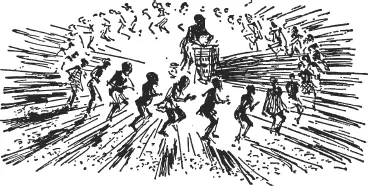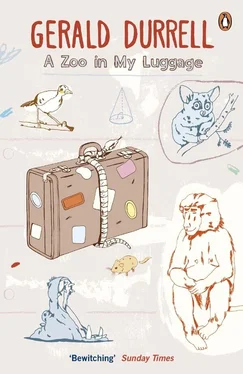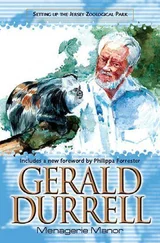Gerald Durrell - A Zoo in My Luggage
Здесь есть возможность читать онлайн «Gerald Durrell - A Zoo in My Luggage» весь текст электронной книги совершенно бесплатно (целиком полную версию без сокращений). В некоторых случаях можно слушать аудио, скачать через торрент в формате fb2 и присутствует краткое содержание. Жанр: Природа и животные, на английском языке. Описание произведения, (предисловие) а так же отзывы посетителей доступны на портале библиотеки ЛибКат.
- Название:A Zoo in My Luggage
- Автор:
- Жанр:
- Год:неизвестен
- ISBN:нет данных
- Рейтинг книги:4 / 5. Голосов: 1
-
Избранное:Добавить в избранное
- Отзывы:
-
Ваша оценка:
- 80
- 1
- 2
- 3
- 4
- 5
A Zoo in My Luggage: краткое содержание, описание и аннотация
Предлагаем к чтению аннотацию, описание, краткое содержание или предисловие (зависит от того, что написал сам автор книги «A Zoo in My Luggage»). Если вы не нашли необходимую информацию о книге — напишите в комментариях, мы постараемся отыскать её.
A Zoo in My Luggage — читать онлайн бесплатно полную книгу (весь текст) целиком
Ниже представлен текст книги, разбитый по страницам. Система сохранения места последней прочитанной страницы, позволяет с удобством читать онлайн бесплатно книгу «A Zoo in My Luggage», без необходимости каждый раз заново искать на чём Вы остановились. Поставьте закладку, и сможете в любой момент перейти на страницу, на которой закончили чтение.
Интервал:
Закладка:
I want to remind you of the last trip which you hired the landrover and settlement has not yet been made.
Your good friend,
Fon of Bafut

Chapter Four. Beef in Boxes

As soon as Bob and Sophie had joined us in Bafut we set about the task of organizing our already large and ever-growing collection. The great, shady verandah that ran round the upstairs rooms of the Fon’s Rest House was divided into three: one section for reptiles, one for birds and one for mammals. Thus each of us had a particular section to look after and whoever finished first lent a hand with somebody else’s group. First thing in the morning we would all wander to and fro along the verandah in our pyjamas carefully looking at each animal to make sure it was all right. It is only by this day-to-day routine of careful watching that you can get to know your animals so well that you detect the slightest sign of illness, when to anyone else the animal would appear to be perfectly healthy and normal. Then we cleaned and fed all the delicate animals that could not wait (such as the sunbirds who had to have their nectar as soon as it was light, and the baby creatures that needed their early morning bottles) and then we paused for breakfast. It was during mealtimes that we compared notes on our charges. This mealtime conversation would have put any normal mortal off his food, for it was mainly concerned with the bowel movements of our creatures; with wild animals, diarrhoea or constipation is often a good indication as to whether you are feeding it correctly, and it can also be the first (and sometimes the only) symptom of an illness.
On any collecting trip acquiring the animals is, as a rule, the simplest part of the job. As soon as the local people discover that you are willing to buy live wild creatures the stuff comes pouring in; ninety per cent is, of course, the commoner species, but they do bring an occasional rarity. If you want the really rare stuff you generally have to go out and find it yourself, but while you are devoting your time to this you can be sure that all the common local fauna will be brought in to you. So one might almost say that getting the animals is easy: the really hard part is keeping them once you have got them.
The chief difficulty you have to contend with when you have got a newly caught animal is not so much the shock it might be suffering from capture, but the fact that the capture forces it to exist in close proximity to a creature it regards as an enemy of the worst possible sort: yourself. On many occasions an animal may take to captivity beautifully, but can never reconcile itself to the intimate terms on which it has to exist with man. This is the first great barrier to break down and you can only do it by patience and kindness. For month after month an animal may snap and snarl at you every time you approach its cage, until you begin to despair of ever making a favourable impression on it. Then, one day, sometimes without any preliminary warning, it will trot forward and take food from your hand, or allow you to tickle it behind the ears. At such moments you feel that all the waiting in the world was justified.
Feeding, of course, is one of your main problems. Not only must you have a fairly extensive knowledge of what each species eats in the wild state, but you have to work out a suitable substitute if the natural food is unavailable, and then teach your specimen to eat it. You also have to cater for their individual likes and dislikes, which vary enormously. I have known a rodent which, refusing all normal rodent food – such as fruit, bread, vegetables – lived for three days on an exclusive diet of spaghetti. I have had a group of five monkeys, of the same age and species, who displayed the most weird idiosyncrasies. Out of the five, two had a passion for hard-boiled eggs, while the other three were frightened of the strange white shapes and would not touch them, actually screaming in fear if you introduced such a fearsome object as a hard-boiled egg into their cage. These five monkeys all adored orange but, whereas four would carefully peel their fruit and throw away the skin, the fifth would peel his orange equally carefully and then throw away the orange and eat the peel. When you have a collection of several hundred creatures all displaying such curious characteristics you are sometimes nearly driven mad in your efforts to satisfy their desires, and so keep them healthy and happy.
But of all the irritating and frustrating tasks that you have to undertake during a collecting trip, the hand-rearing of baby animals is undoubtedly the worst. To begin with, they are generally stupid over taking a bottle and there is nothing quite so unattractive as struggling with a baby animal in a sea of lukewarm milk. Secondly, they have to be kept warm, especially at night, and this means (unless you take them to bed with you, which is often the answer) you have to get up several times during the night to replenish hot-water bottles. After a hard day’s work, to drag yourself out of bed at three in the morning to fill hot-water bottles is an occupation that soon loses its charm. Thirdly, all baby animals have extremely delicate stomachs and you must watch them like a hawk to make sure that the milk you are giving them is not too rich or too weak; if too rich, they can develop intestinal troubles which may lead to nephritis, which will probably kill them, and if too weak, it can lead to loss of weight and condition, which leaves the animal open to all sorts of fatal complaints.
Contrary to my gloomy prognostications, the baby black-eared squirrel, Squill-lill Small (Small to her friends) proved an exemplary baby. During the day she lay twitching in a bed of cotton-wool balanced on a hot-water bottle in the bottom of a deep biscuit-tin; at night the tin was placed by our beds under the rays of a Tilley infra-red heater. Almost immediately we were made aware of the fact that Small had a will of her own. For such a tiny animal she could produce an extraordinary volume of noise, her cry being a loud and rapid series of ‘chucks’ that sounded like a cheap alarm clock going off. Within the first twenty-four hours she had learnt when to expect her feeds and if we were as much as five minutes late she would trill and chuck incessantly until we arrived with the food. Then came the day when Small’s eyes opened for the first time and she could take a look at her foster-parents and the world in general. This, however, presented a new problem. We happened that day to be a bit late with her food. We had rather dawdled over our own lunch, deep in a discussion about some problem or other, and we had, I regret to say, forgotten all about Small. Suddenly I heard a faint scuffling behind me and, turning round, I saw Small squatting in the doorway of the dining-room looking, to say the least, extremely indignant. As soon as she saw us she went off like an alarm clock and hurrying across the floor hauled herself, panting, up Jacquie’s chair and then leapt to her shoulder, where she sat flicking her tail up and down and shouting indignantly into Jacquie’s ear. Now this, for a baby squirrel, was quite a feat. To begin with, as I say, her eyes had only just opened. Yet she had succeeded in climbing out of her tin and finding her way out of our bedroom (piled high with camera equipment and film); she had made her way down the full length of the verandah, running the gauntlet of any number of cages filled with potentially dangerous beasts, and eventually located us (presumably by sound) in the dining-room which was at the extreme end of the verandah. She had covered seventy yards over unknown territory, through innumerable dangers, in order to tell us she was hungry. Needless to say, she got her due of praise and what was more important from her point of view, she got her lunch.
Читать дальшеИнтервал:
Закладка:
Похожие книги на «A Zoo in My Luggage»
Представляем Вашему вниманию похожие книги на «A Zoo in My Luggage» списком для выбора. Мы отобрали схожую по названию и смыслу литературу в надежде предоставить читателям больше вариантов отыскать новые, интересные, ещё непрочитанные произведения.
Обсуждение, отзывы о книге «A Zoo in My Luggage» и просто собственные мнения читателей. Оставьте ваши комментарии, напишите, что Вы думаете о произведении, его смысле или главных героях. Укажите что конкретно понравилось, а что нет, и почему Вы так считаете.










